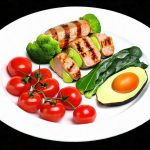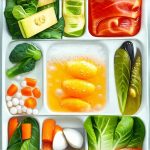The human digestive system is an incredibly complex process, reliant on a delicate balance of factors to efficiently break down food and absorb nutrients. Many people focus on what they eat, but often overlook the importance of how we hydrate alongside our meals. A common concern arising in wellness circles – and frequently discussed online – revolves around the idea that drinking excessive amounts of water during or immediately after eating can dilute digestive enzymes, hindering proper digestion. This seemingly simple question touches upon biochemical processes, physiological responses, and individual variations in gut health, making it a surprisingly nuanced topic. It’s not about avoiding water altogether; quite the contrary, hydration is crucial for overall health. Rather, it’s about understanding whether timing and quantity of water intake can potentially impact digestion and how to optimize our hydration habits for optimal wellbeing.
The premise behind this concern stems from the fact that digestive enzymes operate most effectively within specific pH ranges and concentrations. Enzymes are sensitive biological catalysts; they’re not indestructible. Dilution, theoretically, could lessen their potency, requiring the body to work harder or potentially leading to incomplete nutrient breakdown. However, the human body is remarkably adaptable and possesses several built-in mechanisms to counteract such effects. These include enzyme production regulation, pH buffering systems within the digestive tract, and efficient water absorption throughout the digestive process. This doesn’t automatically negate the question; it simply highlights that the relationship between water intake and enzymatic function isn’t as straightforward as some suggest. The debate often centers on whether the body can effectively compensate for temporary dilution caused by drinking water with meals or if certain individuals are more susceptible to this effect than others.
Digestive Enzymes: Function and Sensitivity
Digestive enzymes, produced in various organs like the pancreas, stomach, and small intestine, are responsible for breaking down complex food molecules into simpler forms that our bodies can absorb. Amylase breaks down carbohydrates, protease tackles proteins, and lipase digests fats. Each enzyme works optimally within a narrow pH range – often slightly acidic to neutral in the stomach, then transitioning to more alkaline in the small intestine. This precise environment is crucial for their function; significant deviations can impair enzymatic activity. However, it’s important to remember that the digestive system isn’t a static environment. It constantly adjusts its pH and enzyme concentrations based on food intake and other physiological signals.
The body possesses sophisticated buffering systems to maintain this delicate balance. For instance, bicarbonate secreted by the pancreas neutralizes stomach acid as chyme (partially digested food) enters the small intestine, creating an optimal alkaline environment for pancreatic enzymes to work. Furthermore, the rate of enzyme secretion is dynamically regulated based on the composition of the meal – more carbohydrates trigger amylase release, while fats stimulate lipase production. This inherent adaptability suggests that minor fluctuations in water concentration are unlikely to significantly disrupt enzymatic activity for most people. The body is designed to handle a certain degree of variation without losing its digestive efficiency.
However, this doesn’t mean dilution isn’t possible. In extreme cases – consuming very large volumes of water rapidly during or immediately after a meal – temporary enzyme dilution could occur. But the extent and consequence of such dilution are often overstated in popular discussions. The body actively works to restore optimal conditions quickly through various adaptive mechanisms, including increased enzyme production and efficient fluid reabsorption along the digestive tract. It’s also worth noting that different individuals may exhibit varying degrees of sensitivity to this phenomenon based on their overall health, gut microbiome composition, and enzymatic function. Understanding role of enzymes can offer additional context.
Individual Factors and Gut Health
The impact of water intake on digestion isn’t uniform across all individuals. Several factors play a crucial role in determining how well someone can cope with potential enzyme dilution:
- Age: As we age, natural enzyme production tends to decline, potentially making older adults more sensitive to disruptions in digestive efficiency.
- Gut Microbiome: A healthy and diverse gut microbiome aids digestion by producing its own enzymes and enhancing the absorption of nutrients. An imbalanced microbiome might reduce overall digestive capacity.
- Existing Digestive Issues: Individuals with pre-existing conditions like low stomach acid (hypochlorhydria), pancreatic insufficiency, or irritable bowel syndrome (IBS) may experience more pronounced symptoms if their digestive processes are further compromised by excessive water intake. These individuals should consult a healthcare professional for personalized advice.
- Dietary Habits: Regularly consuming highly processed foods can impair enzymatic function and overall gut health, potentially exacerbating the effects of water dilution. If you’ve consumed too much junk food, it may affect your digestion more profoundly.
The state of one’s gut health is arguably the most significant factor. A robust gut environment with ample beneficial bacteria can often compensate for minor disruptions in enzyme activity. Conversely, a compromised gut may struggle to maintain optimal digestion even under normal circumstances. Focusing on building and maintaining a healthy gut microbiome through dietary changes (e.g., incorporating probiotic-rich foods) and lifestyle modifications (e.g., managing stress) is therefore a fundamental step towards improved digestive health. Digestive enzymes can also provide support, particularly for those with specific intolerances.
Timing of Water Intake: Before, During, or After Meals?
The timing of water consumption relative to meals appears to be more important than the absolute volume consumed. While drinking large amounts during a meal might theoretically cause greater temporary dilution, it’s not necessarily detrimental for everyone. In fact, some individuals find that sipping small amounts of water during meals aids in food breakdown and prevents constipation. The key is to listen to your body and identify what works best for you.
- Drinking water before a meal can potentially prepare the digestive system by priming the stomach and promoting hydration, but excessive pre-meal water intake could lead to feelings of fullness and reduced appetite.
- Sipping small amounts of water during meals is generally well-tolerated by most people and may even facilitate digestion, especially if the food is dry or difficult to swallow.
- Drinking large volumes of water immediately after a meal might be more likely to cause dilution, but again, this effect is often minimal in healthy individuals with robust digestive systems.
A common recommendation is to avoid guzzling down large quantities of water right before, during, or immediately after meals. Instead, focus on staying adequately hydrated throughout the day by sipping water consistently between meals. This allows for optimal hydration without potentially disrupting enzymatic activity. Spacing out your fluid intake and allowing time for digestion can be a more effective strategy than concentrating it around meal times. Encourage water intake is important, but mindful timing may also play a role.
Practical Strategies for Optimized Digestion & Hydration
Ultimately, optimizing digestive function isn’t about rigidly adhering to strict rules regarding water intake; it’s about adopting a holistic approach that considers individual needs and promotes overall gut health. Here are some practical strategies:
- Listen to Your Body: Pay attention to how your body responds to different levels of hydration around mealtimes. Do you experience bloating, indigestion, or discomfort after drinking water with meals? Adjust your intake accordingly.
- Hydrate Throughout the Day: Prioritize consistent hydration between meals rather than focusing solely on mealtime fluid consumption. Carry a reusable water bottle and sip on it regularly throughout the day.
- Focus on Gut Health: Incorporate probiotic-rich foods (e.g., yogurt, kefir, sauerkraut) into your diet to support a healthy gut microbiome. Consider prebiotics (fibers that feed beneficial bacteria) as well.
- Chew Your Food Thoroughly: Thorough chewing initiates the digestive process and reduces the burden on enzymes. It also allows for better mixing with saliva, which contains digestive enzymes of its own.
- Eat a Balanced Diet: A diet rich in whole, unprocessed foods provides the necessary nutrients for optimal enzymatic function and gut health. Limit processed foods, sugary drinks, and excessive alcohol consumption.
- Manage Stress: Chronic stress can negatively impact digestion and gut health. Incorporate stress-reducing techniques like meditation, yoga, or deep breathing exercises into your daily routine.
It’s crucial to remember that this information is for general knowledge and informational purposes only, and does not constitute medical advice. If you have concerns about your digestive health or suspect an underlying condition, consult a healthcare professional for personalized evaluation and guidance. They can help determine the best hydration strategy based on your individual needs and circumstances. It’s also important to consider if water additives could be causing digestive issues, too. Also, understand if artificial flavors may contribute to your symptoms. Finally, understanding how enzymes influence bowel movements can add clarity.


















